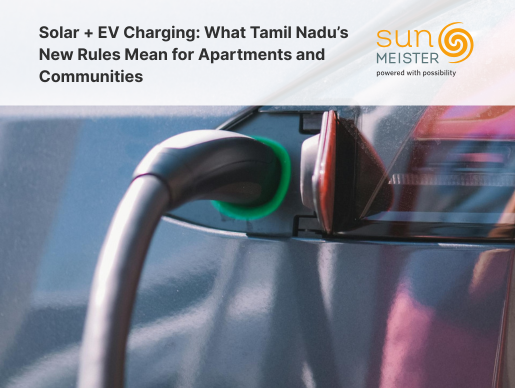Tamil Nadu has taken a major step forward in accelerating EV adoption by updating the Tamil Nadu Combined Development and Building Rules, 2019. A recent government notification now mandates EV charging points in every car and two-wheeler parking space for new residential buildings in the state. With Chennai’s constantly expanding housing sector, this move will significantly increase demand for residential EV charging infrastructure.
However, as highlighted in the news report, experts in the renewable energy sector agree on one thing: if apartment communities are planning to set up EV charging points, the smartest first step is to invest in solar power. Solar energy and EV charging are complementary technologies, and together they form a sustainable, cost-efficient ecosystem.
This is exactly where Sunmeister’s Victron-powered energy solutions become essential.
What Tamil Nadu’s Revised EV Charging Mandate Means
According to the new rules:
Every car and two-wheeler parking slot in residential buildings must include an EV charging point.
Visitor parking in buildings with more than 50 units must include fast charging points.
Smaller buildings (up to 14 m height, with up to 8 dwelling units or 750 sq. m built-up area) are exempt.
This mandate will shape the future of residential construction in Tamil Nadu, making EV readiness a basic requirement rather than a luxury amenity.
Solar First, EV Charging Next – Why This Strategy Makes Sense
Industry voices quoted in the article highlight that apartment associations should install solar panels before investing heavily in EV infrastructure.
Here’s why:
1. Lower Energy Bills
Charging EVs from the grid can get expensive. Solar power dramatically reduces costs, especially in a city like Chennai with high sunlight availability.
2. Government Subsidies Reduce Costs
Through the PM Surya Ghar Scheme, homeowners can get subsidies for 3 kW and above rooftop solar systems.
Additionally, after GST revisions, overall system costs have dropped by approximately 5 percent.
3. 24×7 Power Through Hybrid Solar Systems
Excess solar energy can be exported to the grid and credited, enabling round-the-clock usage including EV charging.
4. Compliance With Existing Rules
Tamil Nadu already mandates that one-third of terrace space must be reserved for solar panels for completion certificates.
The Challenge: Residential vs Commercial Tariffs
Common-area loads (lifts, lights, pumps) are billed under commercial tariff, even in residential buildings.
So even if a community produces solar energy, the deduction isn’t on a unit-to-unit basis. Residents get only around ₹3.80 per unit for energy exported to the grid, while paying about ₹8 per unit under commercial rates.
This contrast discourages many apartment associations from investing in solar unless the system is designed smartly.
How Sunmeister Helps Apartments Overcome These Challenges
1. Smart Solar + EV System Design
Sunmeister designs systems using Victron MPPTs, MultiPlus/Quattro hybrid inverters, and modular energy storage. This reduces grid dependency and maximizes self-consumption of solar energy, lowering exposure to commercial tariffs.
2. Intelligent Energy Routing
Using Cerbo GX and VRM remote monitoring, energy can be prioritized for:
EV charging
Common-area loads
Battery storage
Apartment-level consumption
This ensures solar energy is used internally before being exported at low credit rates.
3. Reliable EV Charging with Victron Stations
Victron EV Charging Stations support:
7.3 kW single-phase charging
22 kW three-phase charging
Dynamic load balancing
Solar-integrated charging logic
Perfect for apartments planning large-scale EV readiness.
4. Scalable Solutions for Large Communities
Whether it is 20 units or 200 units, Sunmeister builds systems that grow with increasing EV adoption.
Why Tamil Nadu’s Policy Is a Game-Changer
This mandate ensures:
Every new apartment will be EV-ready by default
Solar penetration will rise due to synergy with EV needs
Renewable energy will become the backbone of urban mobility
Developers will integrate solar + EV infrastructure as core planning elements
With increasing EV ownership and rising grid tariffs, communities that adopt solar-powered charging early will enjoy long-term savings.
Victron EV Chargers: Smart, Solar-Integrated Charging for Homes and Apartments
As EV adoption accelerates across India, the need for intelligent, safe, and energy-efficient charging infrastructure is becoming essential. Victron EV Charging Stations are engineered to meet this demand by combining robust hardware with advanced power management. Whether installed in individual homes or large apartment communities, Victron chargers deliver fast, reliable charging while integrating seamlessly with solar, battery, and inverter systems.
Unlike basic chargers that draw power directly from the grid, Victron chargers are designed to work as part of a complete renewable energy ecosystem. When paired with Victron MPPT solar charge controllers, MultiPlus or Quattro hybrid inverters, and GX monitoring devices, they can intelligently route and optimize energy — prioritizing solar when available and balancing loads in real time. This is especially valuable for Tamil Nadu, where EV charging in residential communities is now mandatory for new buildings.
With Victron, homeowners and associations can build an EV charging setup that is efficient, safe, and future-ready, without overloading their building’s electrical infrastructure.
Key Features of Victron EV Charging Stations
Smart Solar Integration
Automatically uses excess rooftop solar power for EV charging
Works seamlessly with hybrid systems for 24×7 operation
Helps reduce dependence on grid power and lower energy bills
Dynamic Load Balancing
Adjusts charging power based on available electrical load
Prevents overloads and keeps building circuits stable
Ideal for apartments with multiple chargers running simultaneously
Flexible Power Output
Single-phase chargers up to 7.3 kW
Three-phase chargers up to 22 kW for faster charging
Adjustable current limits to match any home or building setup
Advanced Monitoring and Control
Full integration with Cerbo GX and Victron VRM
Remote monitoring of energy usage, charging sessions, and system performance
Scheduling options for nighttime or solar-preferred charging
Built for Indian Conditions
Weatherproof, IP-rated enclosure for outdoor installation
High-quality European engineering with strong safety protections
Works in areas with voltage fluctuations or inconsistent grid supply
Future-Ready and Scalable
Supports expansion as more EVs are added to a home or community
Compatible with existing Victron solar-battery setups
Designed to work with upcoming high-capacity EV models
Why Sunmeister Recommends Victron for EV Charging
Sunmeister integrates Victron EV chargers into complete renewable energy solutions, ensuring that apartments and homeowners benefit from:
Optimized solar usage
Lower energy costs
Safer electrical systems
Reliable long-term performance
A unified monitoring dashboard for solar, batteries, inverters, and EV charging
This makes Victron the ideal choice for communities in Chennai, Bangalore, Hyderabad, Kerala, and Mumbai that want to stay compliant with new EV mandates while reducing long-term operational costs.
Sunmeister’s Perspective: The Future Is Solar-Driven EV Charging
Sunmeister believes Tamil Nadu is paving the way for a cleaner and more energy-efficient future. As EV charging becomes mandatory in new buildings, solar power will become the most cost-effective and sustainable energy source to support this transition.
With Victron’s advanced technology and Sunmeister’s expertise in hybrid energy systems, Tamil Nadu’s apartments can now build:
Cleaner rooftops
Smarter charging hubs
Lower electricity bills
Stronger energy independence
The sun isn’t just powering homes anymore. It’s powering movement.

